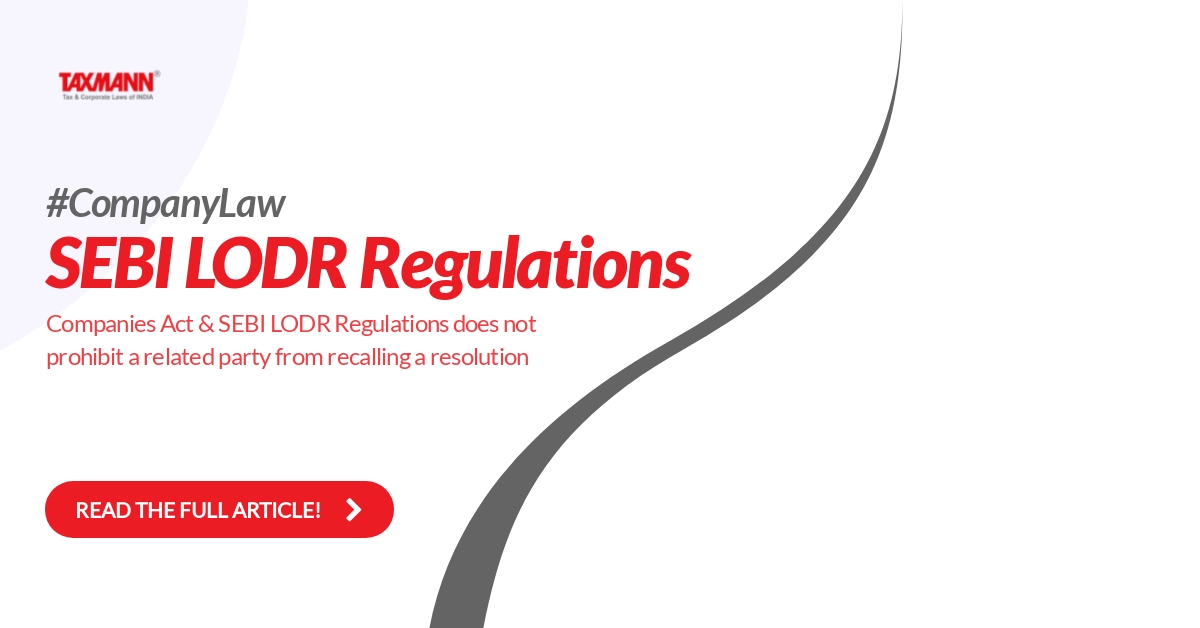Companies Act & SEBI LODR Regulations does not prohibit a related party from recalling a resolution
- Blog|News|Company Law|
- 2 Min Read
- By Taxmann
- |
- Last Updated on 22 March, 2022

Case Details: R.T. Agro (P.) Ltd. v. Securities and Exchange Board of India - [2022] 136 taxmann.com 133 (SAT - Mumbai)
Judiciary and Counsel Details
-
- Justice Tarun Agarwala, Presiding Officer and M.T. Joshi, Judicial Member
- Pesi Modi, Sr. Adv., Neville Lashkari, Anshuman Sugla and Ms. Tanya Gupta Advs. for the Appellant.
- Gaurav Joshi, Sr. Adv., Abhiraj Arora, Karthik Narayan, Harshvardhan Nankani and Shourya Tanay, Advs. for the Respondent.
Facts of the Case
In the instant case, Company R.T. Exports Ltd. (appellants) proposed to enter into a transaction with ‘Neelkanth Realtors Pvt. Ltd.’ for the purchase of residential space.
The proposal was treated as a material-related party transaction given clause 49 of the Listing Agreement and, accordingly, such proposal was required to be approved by the shareholders of the Company.
A special resolution was approved by R.T. Exports Ltd. concerning an MoU with Neelkanth Realtors Pvt. Ltd. In terms of section 188 of the Companies Act, 2013, the related parties abstained from voting on the special resolution.
Thereafter, an EGM was held for rescinding the resolution in which related party entities voted. Prior to voting, the related party entities took opinion from a company law expert who opined that related party entities could cast their votes in view of the fact that section 188 of the Companies Act only prescribed that related parties shall not participate in the voting process only for entering into a related party transaction and not for rescinding a related party transaction.
A complaint was filed before the SEBI alleging that the appellants had violated regulation 23 of the LODR Regulations. The AO after considering the replies found that the appellants being related party entities have violated regulation 23 of the LODR Regulations and, accordingly, imposed a penalty of Rs. 5 lakhs on each of the appellants. The appellants being aggrieved by the order filed the present appeal.
The question that arose for consideration before the Appellate Tribunal was whether the appellants were justified in voting for rescinding the resolution in spite of being related party entities?
The SAT observed that, from a perusal of section 188 of the Companies Act, it was clear that no member of the Company shall vote on such resolution to approve any contract or arrangement which may be entered into by the Company if such member is a related party.
SAT Held
The SAT held that Section 188 of the Companies Act as well as regulation 23 of the LODR does not prohibit related party entities from voting for recalling/rescinding resolution which was passed earlier by the Company.
In the absence of any such prohibition it was open to the appellants to participate in the resolution of 16th December, 2016. The bar under section 188 of the Companies Act and regulation 23(7) of the LODR Regulations is that no related party can vote to approve any contract or arrangement in which he is a related party.
Quashing the impugned order, SAT held that the appellants did not commit any violation. the SAT held that AO committed an error in holding that appellant had violated regulation 23 of the LODR Regulations.
Disclaimer: The content/information published on the website is only for general information of the user and shall not be construed as legal advice. While the Taxmann has exercised reasonable efforts to ensure the veracity of information/content published, Taxmann shall be under no liability in any manner whatsoever for incorrect information, if any.

Taxmann Publications has a dedicated in-house Research & Editorial Team. This team consists of a team of Chartered Accountants, Company Secretaries, and Lawyers. This team works under the guidance and supervision of editor-in-chief Mr Rakesh Bhargava.
The Research and Editorial Team is responsible for developing reliable and accurate content for the readers. The team follows the six-sigma approach to achieve the benchmark of zero error in its publications and research platforms. The team ensures that the following publication guidelines are thoroughly followed while developing the content:
- The statutory material is obtained only from the authorized and reliable sources
- All the latest developments in the judicial and legislative fields are covered
- Prepare the analytical write-ups on current, controversial, and important issues to help the readers to understand the concept and its implications
- Every content published by Taxmann is complete, accurate and lucid
- All evidence-based statements are supported with proper reference to Section, Circular No., Notification No. or citations
- The golden rules of grammar, style and consistency are thoroughly followed
- Font and size that’s easy to read and remain consistent across all imprint and digital publications are applied



 CA | CS | CMA
CA | CS | CMA
